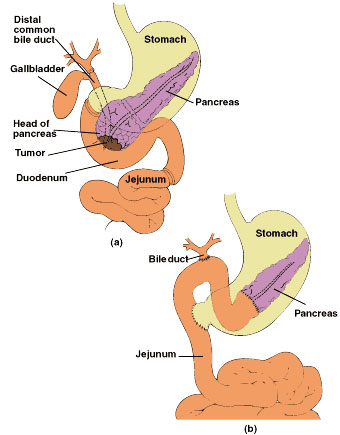Multidisciplinary Treatment of Pancreatic Diseases
The treatment of pancreatic cancer and noncancerous pancreatic disorders often requires a multipronged approach. Specialists at the Center for Advanced Digestive Care of NewYork-Presbyterian/Weill Cornell Medical Center offer the following therapies to treat these diseases and to relieve pain:
Minimally Invasive Treatments
Many patients with pancreatic cancer, pancreatitis, cysts/pseudocysts, blockages of the pancreatic duct, and other disorders may benefit from advanced endoscopic approaches to clear obstructions and remove diseased tissue. For example, such approaches can be used to open blocked bile ducts in patients with pancreatic cancer, treat chronic pancreatitis, repair leaky pancreatic ducts, and destroy stones.
Surgery
Surgery is the standard treatment for patients with cancer that has not spread beyond the pancreas. Specialists at the Center for Advanced Digestive Care customize pancreatic surgery for each patient to remove the tumor while preserving healthy tissue. We take a minimally invasive approach whenever possible, using laparoscopic techniques.
Our surgeons are highly experienced in performing the Whipple procedure (pancreaticoduodenectomy – removal of the head of the pancreas, part of the small intestine, the gall bladder, part of the stomach, and lymph nodes near the head of the pancreas). The Whipple procedure is the most common operation for pancreatic cancer. We successfully perform this operation in older patients and achieve good outcomes.
We also offer a range of services for patients with chronic pancreatitis who require surgery. Examples include the

Whipple procedure; subtotal pancreatectomy (partial removal of the pancreas); and total pancreatectomy (complete removal of the pancreas) with the option of islet cell transplantation, an investigational procedure used to prevent diabetes in patients after pancreatic removal. (See the Research section for more on this technique.) Our surgeons also perform the Frey's and Puestow procedures, in which part of the small intestine is attached to the pancreatic duct to facilitate drainage.
Chemotherapy
Some patients diagnosed with inoperable tumors are able to have surgery after receiving chemotherapy beforehand ("neoadjuvant" chemotherapy). Patients who may benefit from chemotherapy after surgery, as well as those with inoperable tumors, may respond to regimens that use multiple drugs. Patients are also offered participation in clinical trials of new agents for which they may be eligible.
Radiation Therapy
Our radiation oncologists use highly focused radiation therapy, called IMRT, to map the tumor and destroy it while reducing damage to surrounding healthy tissue. Some patients are able to have neoadjuvant radiation therapy, delivered before surgery to shrink a tumor in order to enhance our surgeon's ability to remove a pancreatic cancer.
To schedule an appointment, call the Center for Advanced Digestive Care at


